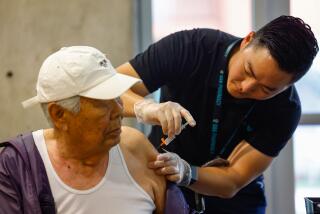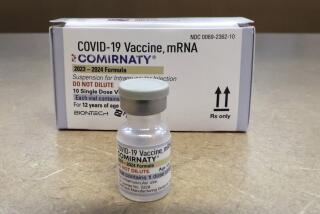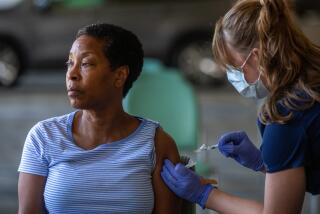Officials may recommend 3 flu shots
In a sign of heightened concern that the upcoming flu season could be severe, top national and local health officials warned Wednesday that employers should brace for worker absences and cautioned the public that as many as three shots this season may be needed to protect against the H1N1 strain and seasonal flu.
In Washington, Commerce Secretary Gary Locke urged that common sense take precedence over “the Puritan work ethic.”
He joined two other Cabinet secretaries to tell business owners to prepare for losing key employees to swine flu for days at a time. Federal officials told employers to encourage hand washing and aggressively clean work areas and to send ill workers home at the first hint of flu symptoms, expecting that they will be out for three to five days.
Locke also suggested that employers consider curtailing face-to-face meetings and limiting company travel to prevent swine flu’s spread. Business owners, officials said, should be open to telecommuting and other options that could allow employees to work from home.
“Be responsible and understanding for the absenteeism that needs to occur with this strain of the flu,” said Homeland Security Secretary Janet Napolitano.
In Los Angeles County, health officials asked the public to get not only the regular seasonal flu shot, but also as many as two additional inoculations to protect against the H1N1 strain.
Dr. Jonathan Fielding, the county’s health officer, said at a news conference Wednesday that three shots may be needed because initial studies suggest a single swine-flu inoculation may not be sufficient. Fielding asked doctors and other medical providers to sign up for the H1N1 flu vaccine by registering online at the county Department of Public Health’s website.
Whether world health officials will recommend two doses remains unclear. Officials say they are still waiting for tests before finalizing their recommendations.
The first batches of swine-flu vaccine are expected to become widely available in October. The seasonal flu vaccine should be in clinics and pharmacies by September, Fielding said.
Inoculations for both -- which can be administered by injection or nasal spray -- can be given on the same day. But the second swine flu vaccination, if recommended, would probably be given three or four weeks after the first dose.
Health officials acknowledged that recommending as many as three flu shots this fall could cause some confusion, but said the possibility was unavoidable because H1N1 emerged as a threat after the seasonal flu shot was in production.
The U.S. Centers for Disease Control and Prevention is recommending that the most at-risk populations receive the H1N1 vaccine first. Those populations include pregnant women, healthcare workers, parents and caregivers for children under 6 months old, people ages 6 months to 24 years, and those ages 25 through 64 with chronic health disorders or compromised immune systems.
Those groups constitute 159 million people in the United States -- more than half of the population.
Once those groups have been vaccinated, U.S. health officials will recommend that people ages 25 through 64 receive H1N1 shots.
Those 65 and older actually have a lower risk of contracting swine flu, because they encountered flu strains as children that offer them some protection, Fielding said. But health officials said seniors should get shots for the seasonal flu as soon as the vaccine is available. Once demand for the swine flu vaccine is met for those under 65, inoculations will be recommended for seniors, CDC officials said.
Fielding offered some common-sense guidelines, urging people to wash hands with soap and water for at least 20 seconds, to cover their sneezes or coughs with a tissue -- or at least to sneeze or cough into the crook of their arm. People should avoid touching their eyes, nose or mouth -- places where the flu virus enters the body.
Federal officials advised parents to limit an ill child’s contact with other family members by creating a “sick room.” If a member of the household is sick, parents are asked to keep school-age children home five days because they are at high risk of falling ill and spreading the flu to classmates.
Earlier this month, after first recommending that schools close when a student was diagnosed with swine flu, federal officials said they would leave decisions on school closures to local authorities.
--
kim.geiger@latimes.com
Lin reported from Los Angeles and Geiger from Washington.
More to Read
Sign up for Essential California
The most important California stories and recommendations in your inbox every morning.
You may occasionally receive promotional content from the Los Angeles Times.











